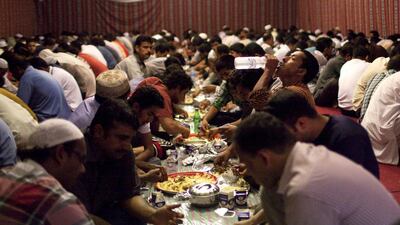ABU DHABI // The spirit of giving during the holy month – epitomised by the many iftar tents offering free food across the emirate – has some undesired side effects.
Although Ramadan is to be celebrated, it also means an increased workload for Tadweer, the Centre of Waste Management, as the daily amount of waste generated is 10 per cent more than the 1.73 kilograms that each person produces, on average, each day.
At iftar tents, food, packaging and plastic cutlery are often discarded and Tadweer said food portions were clearly too big, judging by the amount of leftovers going to landfill sites.
“We have observed that people mostly discard the half-finished food in the packet, which goes to rubbish bins, along with foam and plastic,” said Fatima Al Harmoudi, a public awareness officer at Tadweer.
She suggested that meal packets – which often consist of chicken biryani, sauce, juice, water, fruit and dates – should be made smaller and anyone who was still hungry after having a packet could have a second one.
Ms Al Harmoudi also estimated that 15 per cent of the food that diners placed on their plates at hotel buffets was wasted.
Reducing food portions at school canteens, hotels and homes would help to curb waste, she said.
Tadweer staff visit mosques, Ramadan tents and even homes to educate people on minimising waste.
“If you can’t finish the food and it’s safe, put it in a separate box and give it to needy workers,” said Ms Al Harmoudi.
“Always take small portions of food for your plate. If you feel you want more, take it.”
She said Tadweer staff visited more than 400 schools each year to raise awareness. “I have told schools that they should not sell big sandwiches in canteens. Instead, prepare smaller sandwiches with lower prices,” said Ms Al Harmoudi.
“I have asked children to tell their mums to cook smaller meals and not to give them food that they can’t finish.”
Tadweer’s major challenge is raising awareness about the need to minimise waste. The transient nature of workers from more than 200 nationalities in the capital means that the message has to be repeated often.
Food waste creates methane, a greenhouse gas that adversely affects the environment.
“I collect rubbish around the city, so I know that plenty of food is discarded, particularly biryani, said Hassan Ali, a Bangladeshi cleaner who lives in Mussaffah.
He usually has iftar meals at Ramadan tents at the weekends.
“I am a poor worker so I don’t leave anything there. Instead I bring that meal packet to my room and eat it later or share it with other room-mates who couldn’t visit the iftar tent.”
Iftar meal packets provide more than enough food for each person, according to Widan Gull, a Pakistani delivery driver who lives in Dubai.
“I tell my room-mates to bring home only what they can finish, because the food belongs to poor people,” he said.
anwar@thenational.ae

